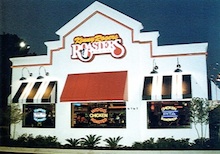Kenny Rogers Roasters
Kenny Rogers Roasters is a chain of chicken-based restaurants. It was founded in 1991 by country musician Kenny Rogers and former Kentucky Governor John Y. Brown, Jr., who had previously helped to build KFC into a global franchise. The restaurant chain is well-known for its wood-fired rotisserie chicken, a cooking method that differentiates it from other fast-food chicken restaurants by emphasizing a healthier way of cooking chicken. Over the years, Kenny Rogers Roasters has expanded its menu to include a variety of comfort foods, including side dishes, soups, and desserts.
History[edit | edit source]
The first Kenny Rogers Roasters restaurant opened in Coral Springs, Florida in 1991. The brand quickly gained popularity, expanding both domestically and internationally. In the mid-1990s, Kenny Rogers Roasters was one of the fastest-growing restaurant chains in the United States. However, by the late 1990s, the company faced intense competition from other fast-food chains and began to struggle financially. In 1998, the chain was acquired by Nathan's Famous, Inc., which began a process of rebranding and restructuring.
Despite its challenges in the U.S. market, Kenny Rogers Roasters found significant success in Asia, particularly in Malaysia, the Philippines, and China, where the brand continued to expand. In these markets, Kenny Rogers Roasters adapted its menu to cater to local tastes while maintaining its core offerings of rotisserie chicken and healthy sides.
Menu[edit | edit source]
The menu at Kenny Rogers Roasters features a variety of options centered around its signature wood-fired rotisserie chicken. This includes individual and family meal options that come with various sides such as mashed potatoes, coleslaw, and cornbread. The restaurant also offers a range of sandwiches, salads, and soups, catering to those looking for lighter or healthier meal options. Desserts and beverages, including Kenny's famous muffins and a selection of sodas and juices, round out the menu.
International Presence[edit | edit source]
Kenny Rogers Roasters has a significant international presence, with a strong focus on the Asian market. The brand has successfully localized its offerings in these regions, incorporating local flavors and dishes into the menu. This strategy has allowed Kenny Rogers Roasters to maintain its relevance and appeal in diverse markets, despite the competitive nature of the fast-food industry.
Cultural Impact[edit | edit source]
Kenny Rogers Roasters gained additional fame and cultural significance through a memorable episode of the popular television show Seinfeld. In the episode titled "The Chicken Roaster", the bright neon lights of a Kenny Rogers Roasters sign disrupt Kramer's apartment, leading to a series of comedic events. This episode further cemented the brand's place in American pop culture.
Current Status[edit | edit source]
As of the last update, Kenny Rogers Roasters continues to operate in several countries, with a particularly strong presence in Asia. While the brand has faced challenges in the U.S. market, leading to the closure of many of its locations there, its international operations have thrived. The company's focus on healthy, flavorful food and its adaptability to local tastes have been key factors in its enduring popularity.
Search WikiMD
Ad.Tired of being Overweight? Try W8MD's physician weight loss program.
Semaglutide (Ozempic / Wegovy and Tirzepatide (Mounjaro / Zepbound) available.
Advertise on WikiMD
|
WikiMD's Wellness Encyclopedia |
| Let Food Be Thy Medicine Medicine Thy Food - Hippocrates |
Translate this page: - East Asian
中文,
日本,
한국어,
South Asian
हिन्दी,
தமிழ்,
తెలుగు,
Urdu,
ಕನ್ನಡ,
Southeast Asian
Indonesian,
Vietnamese,
Thai,
မြန်မာဘာသာ,
বাংলা
European
español,
Deutsch,
français,
Greek,
português do Brasil,
polski,
română,
русский,
Nederlands,
norsk,
svenska,
suomi,
Italian
Middle Eastern & African
عربى,
Turkish,
Persian,
Hebrew,
Afrikaans,
isiZulu,
Kiswahili,
Other
Bulgarian,
Hungarian,
Czech,
Swedish,
മലയാളം,
मराठी,
ਪੰਜਾਬੀ,
ગુજરાતી,
Portuguese,
Ukrainian
Medical Disclaimer: WikiMD is not a substitute for professional medical advice. The information on WikiMD is provided as an information resource only, may be incorrect, outdated or misleading, and is not to be used or relied on for any diagnostic or treatment purposes. Please consult your health care provider before making any healthcare decisions or for guidance about a specific medical condition. WikiMD expressly disclaims responsibility, and shall have no liability, for any damages, loss, injury, or liability whatsoever suffered as a result of your reliance on the information contained in this site. By visiting this site you agree to the foregoing terms and conditions, which may from time to time be changed or supplemented by WikiMD. If you do not agree to the foregoing terms and conditions, you should not enter or use this site. See full disclaimer.
Credits:Most images are courtesy of Wikimedia commons, and templates, categories Wikipedia, licensed under CC BY SA or similar.
Contributors: Prab R. Tumpati, MD



